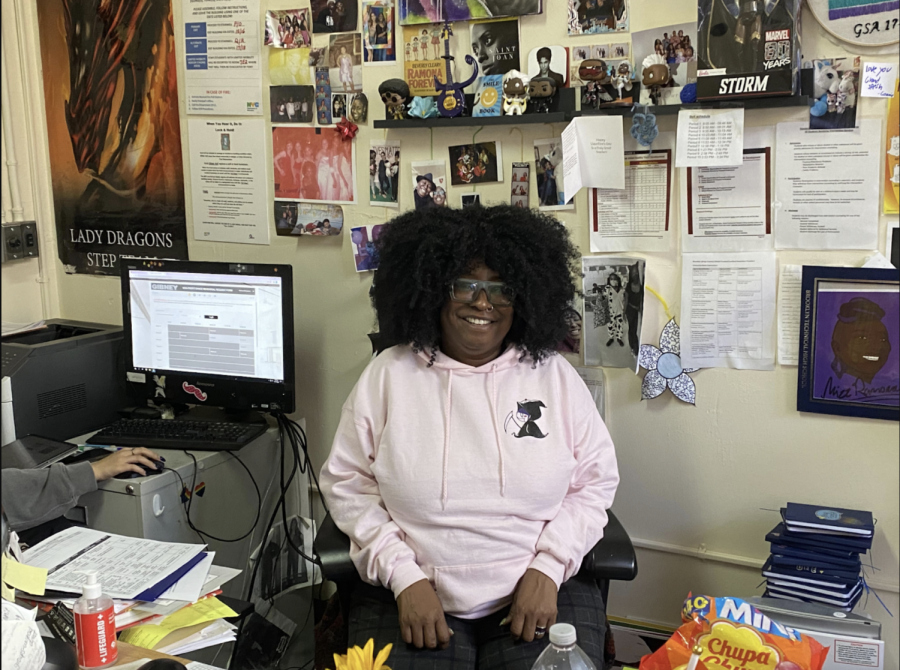A Look Into SPARK: The Substance Prevention Team at Tech
November 21, 2022
There’s an unwritten rule that all students at Tech follow: If students accidentally stumble on others doing things they’re not supposed to, everyone will most likely keep quiet – at least when adults are around. Administrators can’t seem to crack the invisible code to get students to open up. As a result, the adults within Tech generally aren’t aware of student drug use.
This is where SPARK, Substance Prevention and Rehabilitation through Knowledge, comes in. It’s run by Ms. Ramona Richardson. Her job isn’t just to walk into classrooms and tell students that drugs are unhealthy – she thoroughly explains and informs students that there are always better choices than turning to drug use, like picking up hobbies. Richardson, herself, is the advisor for the Crochet Club, GSA Club, and the Lady Dragons STEP Team. She explained, “Some people find it difficult to distract themselves, and they can’t find anything that’ll naturally motivate them to not turn to drugs.” Some activities may seem cliche and boring, but they help to manage stress and redirect focus away from harmful habits.
Part of SPARK’s mission is to attempt to determine why teenagers turn to drug use in the first place. Sara Enferri (‘25) shared her belief that it’s peer pressure that pushes many students to try drugs. “If all of your friends are doing it, and you’re the only one that’s not, you’re going to feel left out. Obviously no one wants to be left out, so they’ll try it just once, which turns into twice, then three times, then five, until it’s almost impossible to stop.” Teenagers are usually afraid of rejection, or being the odd one out, which makes them willing to do things they normally wouldn’t do otherwise, just to fit in or be validated.
Ardita Shahriar (‘25) thinks a lot of students also turn to drugs because they don’t want to burden their friends or family with their personal struggles. “They might think no one wants to hear about their troubles, and they’re only burdening their friends by ‘trauma-dumping’,” Shahriar observed. Trauma dumping is defined as the act of venting stress onto a friend, family member, or peer. At first, this method was widely welcomed due to its proven positive side effects. Adolescents, specifically, embraced the idea of turning to their peers for help. However, people soon began getting tired of hearing someone else’s problems and being expected to help, while receiving nothing in return. So they, in turn, complained to their other friends, who then complained to their other friends, initiating an endless cycle of complaints and frustration that seemed almost impossible to put an end to. Thus, the negative connotation of “trauma dumping”.
Richardson works to avoid such dangerous thinking. “I want everyone to know that my door is always open. There’s no imaginary boundary,” she declared. “Just walk right in and I’ll be more than happy to help! Anyone is welcome for any reason at all.”
SPARK is the only substance abuse counseling service in the school, and many Tech students aren’t aware of it. “To be fair,” Richardson explained, “Most students who would know me don’t yet, because of remote learning. As you can see, this room is full of seniors, since they knew me before the pandemic.” She admits it is possible SPARK needs to do a better job in the context of advertisements and outreach.
According to Richardson, based on the number of students that have admitted to using either on their own or because they were caught, just 10% of our student population are using drugs on a regular basis. “Although, honestly,” she laughed, “when I’m leaving school, and walking past Rocky’s, and I see those little groups of kids smoking in the triangle, I understand why people think of Tech as a school where drug use is extremely common.”
Administrators are unsure of how to curb student drug use at Tech, especially since students refuse to open up. This makes SPARK’s work all the more significant. However, students have differing views on what steps administrators should take. Rashad Khan (‘25) thinks Tech should bring back the bag checks. “As long as there’s privacy to some extent, it should be fine, ” he stated. Others, such as Richardson, and Tasnia Chowdhury, a junior in the Biological Sciences major, disagree. Richardson elaborated, “What are they planning to achieve with the bag checks? Are they going to take my medications from me?” Chowdhury agreed, clarifying, “It’s not effective. People are going to find other ways to bring it in, if they really want to.”







































